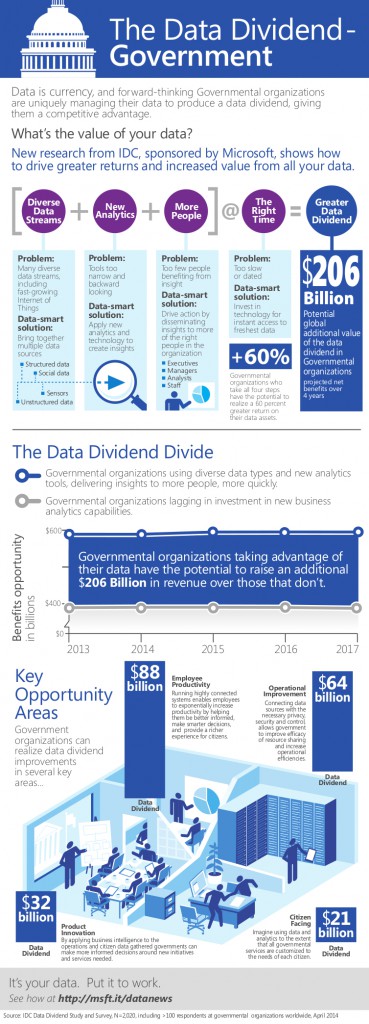By Gary Wachowicz, Industry Managing Director, Worldwide Public Sector
In cities all over the world, a transformation is occurring, driven by the ability to manage and glean insights from data. Whether it’s government administration, public safety, buildings, transportation or tourism, cities are finding new ways to connect IT systems and free up data to improve services across nearly every city function.
According to Microsoft-sponsored research from IDC, government organizations worldwide stand to gain $206 billion in value from data over the next four years by connecting data streams, using new analytics tools, delivering insights to more people, and what’s more, doing it quickly. So what can modern cities do to become “smart cities” and tap into this data dividend?

There are four main trends in technology that can begin enabling a city to reap big benefits right away: cloud, mobile and embedded devices, social media, and analytics. Unifying these technologies is most easily accomplished through a proven platform that works cohesively from end to end using open standards.
Cities should look for a secure cloud platform, powerful and modern analytics software, familiar productivity tools and technologies that can work with the same data from the moment it is collected by sensors or mobile devices, all the way to desktop, laptop and tablet computers in use by city employees.
Once data is open and available, almost any city operation can be enhanced through technology. When it comes to city administration, for example, consider citizen services, tax and revenue, document and records management, and social analytics.
For example, the Singapore Public Utilities Board/National Water Agency (PUB) worked with Microsoft to develop the MyWaters app for Windows Phone and Windows 8 to deliver Singaporeans water-related information before it is too late. Natural disasters including flash floods and rising sea levels can often catch people off guard. Users can check the app for information about key drains and canals during storms, and get real-time updates and images from CCTVs on road situations during heavy downpours. Users can also view and share photos from PUB’s Active, Beautiful, Clean Waters sites; learn water conservation tips; and provide feedback on water-related issues so the agency can better respond during emergencies. The app has provided citizens with seamless up-to-date information, while providing a great channel for the agency to interact with users.
Public safety is another area where technology can offer innovative, affordable solutions that help improve the lives of citizens. Incorporating mobile devices and social media can help modernize a city’s 911 systems and ensure a fast, coordinated response when seconds matter most. In partnership with Intergen, New Zealand (NZ) Police developed a collaboration platform and a social media monitoring tool to enhance situational awareness and deliver real-time intelligence. These systems are supporting improved decision-making during incidents and regular patrols, and help officials provide faster and more meaningful responses to any situation.
Transportation is one of the most important drivers for social and economic development, so it’s not surprising that this is another big area where cities around the world are investing in technology. Auckland Transport uses business intelligence (BI) to analyze 4 terabytes (8 billion rows) of operational data. For example, it analyzes bus ridership data to discover the most popular routes and the problems passengers are encountering so that it can expand routes and improve the rider experience. BI insights also help to reduce infrastructure costs by helping Auckland Transport detect small problems, like potholes, before they develop into bigger and more expensive problems.
Efficient, healthy cities are competitive cities, able to attract more citizens, businesses and tourists, and build robust, stable commerce. In this era of rapid urbanization and decreasing budgets, governments must find ways to address urban challenges and build new capabilities with less. Using technology to build a new data dividend for citizens just makes sense.




